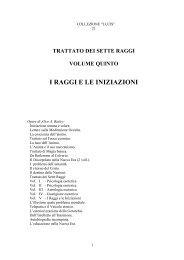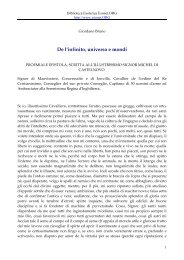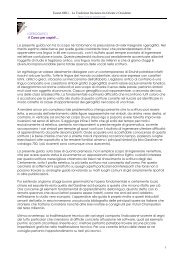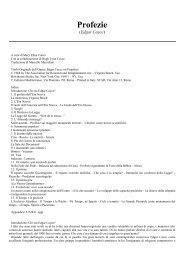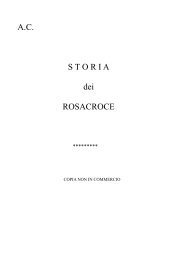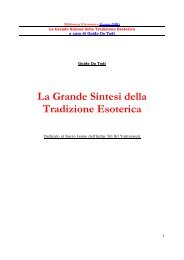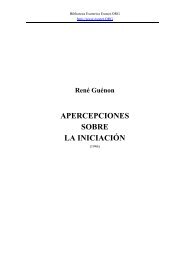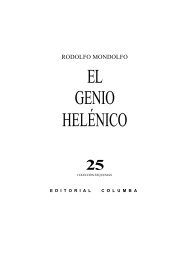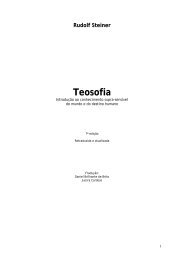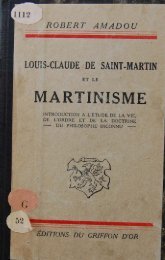Biblioteca Esoterica Esonet.ORG http://www.esonet.ORG 1
Biblioteca Esoterica Esonet.ORG http://www.esonet.ORG 1
Biblioteca Esoterica Esonet.ORG http://www.esonet.ORG 1
You also want an ePaper? Increase the reach of your titles
YUMPU automatically turns print PDFs into web optimized ePapers that Google loves.
CHAPTER EIGHT<br />
Constitution of Man -<br />
The Physical and Psychic Bodies - 1<br />
<strong>Biblioteca</strong> <strong>Esoterica</strong> <strong>Esonet</strong>.<strong>ORG</strong><br />
<strong>http</strong>://<strong>www</strong>.<strong>esonet</strong>.<strong>ORG</strong><br />
While Part Two dealt with the pattern of the cycle of being, the Movement of Wholeness,<br />
in terms of essentially abstract principles which can be applied universally. Part Three<br />
focuses attention upon the cycle of being of a particular entity experienced as a man or<br />
woman. The biologist and the psychologist consider such an entity primarily a physical<br />
organism whose life span extends between birth (or conception) and death. But from the<br />
perspective of the mental attitude outlined in Parts One and Two, the life span of a man or<br />
woman constitutes only one half of a whole cycle of being — its symbolic Day period of<br />
predominantly objective activity and consciousness. The person called Peter or Jane refers<br />
to this Day hemicycle. A full understanding of such a person requires the consideration of<br />
the other half of the cycle — a Night period of predominantly subjective activity and<br />
consciousness.<br />
The difficulty encountered when attempting to deal with this Night half-cycle is that it<br />
does not refer to the human being known as Peter or Jane, a being whose physicality —<br />
one comes to realize — is only the external appearance assumed by a combination of<br />
factors which in their, togetherness constitute a whole of being. After death, this<br />
combination ceases to exist as the Peter or Jane we knew as a living person, yet the<br />
component factors in this physically experienced person do not disappear. As I have<br />
repeatedly stated, there is no place for non-being in the concept of wholeness of being I am<br />
presenting. There is only being — being in a perpetual and rhythmic (or cyclic) state of<br />
transformation in which a continual combining and recombining of elements occur. Being<br />
implies a multiplicity of elements, because "to be" is to be a whole — one among the<br />
seemingly infinite (because indefinable) number of concretizations of Wholeness.<br />
When I speak of Peter or Jane, I have in mind a temporary combination of factors<br />
constituting a human being in the state of physical existence. This combination breaks<br />
down at death, but the Wholeness of which this being was but one phase retains its<br />
identity of being in new conditions. The physically experienceable Peter or Jane is not a<br />
whole of being. He or she represents — I repeat — only a half-cycle of being. Each of the<br />
diverse elements combined to constitute a particular person during this hemicycle follows<br />
its own course during the other half of the cycle, the symbolic Night period. A new<br />
combination occurs when the entire cycle ends, because the end of one cycle is also the<br />
beginning of a new one. The continuum of being has no end; the Movement of Wholeness<br />
never stops.<br />
The new is the progeny of the old. In a sense it is the old reborn; but not all the<br />
elements of the old combination, Peter or Jane, will be parts of the new combination, John<br />
or Barbara. This must be so because the cycle of being of a particular human whole is an<br />
open cycle. It has to be open because it is actually only a very small sub-subcycle within<br />
the cycle of humanity, the planet earth, the solar system, and the galaxy. During the period<br />
between the birth of the old combination and the birth of the new combination, the entire<br />
universe — particularly the whole planet and human societies and their cultures —<br />
95



